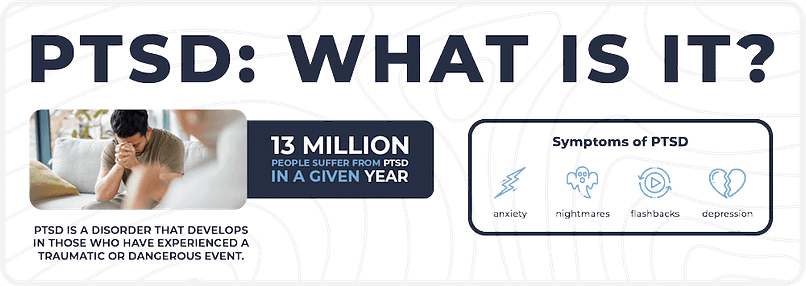Check out the following blogs to learn more about PTSD treatment:

Healing Begins Here

What is PTSD?
PTSD may last for months or years after multiple traumatic events such as natural disasters. Not everyone experiences this level of trauma from the same type of events. However, people with PTSD suffer:
- Ongoing anxiety
- Agitation
- Depression
Our expert team helps individuals overcome trauma, anxiety, and depression through our comprehensive treatment programs, including specialized trauma therapy Portland for those seeking targeted support. For those managing both mental health and substance use challenges, exploring some of the best dual diagnosis treatment centers can connect you with programs that provide integrated, personalized care for lasting recovery.
- Nightmares
- Memory loss
- Flashbacks
The symptoms of PTSD can be very severe and can severely affect a person’s quality of everyday life. A study by the National Institutes of Mental Health found that nearly 5 million Americans suffer from PTSD. This number is disproportionately higher in military veterans at 10%–17% compared to 1%–3% in the general population.
The symptoms of PTSD are categorized into these four main groups:
- Re-experiencing
- Avoidance/Emotional Numbness
- Arousal
- Cognition (Thought Processes/Intrusive Thoughts)
People with PTSD will often focus on re-experiencing symptoms since they are often the most visible. Some individuals with PTSD have been known to have hallucinations or delusions regarding these symptoms. In addition, there may be physical symptoms such as a headache or stomachache.
Those who experience PTSD will often try to avoid triggers that lead them to think about their traumatic events. In addition, they may often feel angry and/or anxious in response to triggers that cause them to relive their traumatic experiences. Cognitive behavioral therapy can assist with overcoming trauma through treatment.
What is Complex Trauma?
Holistic Therapies for PTSD
- Art therapy
- Meditation
- Massage
- Yoga therapy
- Acupuncture
- Mindfulness training
What We Offer at Our PTSD Treatment Center
PTSD treatment at Crestview Recovery begins with a comprehensive evaluation to determine the best course of trauma treatment. We offer both inpatient and outpatient treatment programs, depending on the needs of the patient. Inpatient treatment is typically recommended for those who are struggling with more severe symptoms or who have not been successful in previous attempts at outpatient treatment.
Our inpatient program includes individual therapy, group therapy, and family therapy to involve family members, as well as medication management and other services. The goal of treatment is to help patients develop the skills they need to cope with their symptoms and triggers and to experience healing. We also work with patients to address any underlying issues that may be contributing to their disorder.
Outpatient treatment is typically recommended for those who are struggling with less severe symptoms. Our outpatient program includes individual psychotherapy and group therapy, as well as medication management and other services. The goal of treatment is to help patients develop the skills they need to cope with their symptoms and triggers and to experience healing. We also work with patients to address any underlying issues that may be contributing to their disorder, such as co-occurring disorders like trauma and depression.
Inpatient PTSD Treatment FAQs
The most effective treatment for PTSD is trauma-focused psychotherapy, such as Cognitive Processing Therapy (CPT), Prolonged Exposure (PE), or Eye Movement Desensitization and Reprocessing (EMDR). These therapies help individuals process traumatic memories, reduce distressing symptoms, and build healthy coping strategies. In some cases, medications like SSRIs or SNRIs may also be used to support recovery.
EMDR is a good modality to treat PTSD. It involves guided eye movements and other bilateral stimulation while processing traumatic memories. This process leads to reduced stress and improved emotional processing. Therapists will guide the patient through a series of standardized procedures. Overall, the goal of EMDR is to help individuals reprocess their traumatic events and reduce the emotional intensity associated with the memory. In turn, this will assist the individual in developing healthier coping strategies.
Yes, this body-focused modality shows promise in treating PTSD and other trauma-related disorders, such as complex PTSD, otherwise known as C PTSD. It helps complex PTSD through body awareness and relaxation techniques that encourage physical and emotional release. Unlike other mental health therapies, SE uses the body as a gateway to explore trauma indirectly and gradually, making it a useful holistic approach to overcoming physical and emotional trauma.
PTSD triggers can vary widely, but they’re usually reminders of the traumatic event that activate intense emotional or physical reactions. Common triggers include sensory cues like certain sounds, smells, or visual settings; emotional stressors such as arguments or feelings of loss of control; and anniversaries or media related to the trauma. Even subtle reminders—like a tone of voice or a specific location—can worsen PTSD symptoms by making the person feel as though they are reliving the event.
PTSD can worsen with age if left untreated, especially when stress, health issues, or memory changes make coping more difficult. Older adults may experience resurfacing symptoms triggered by life transitions, loss, or reminders of past trauma. However, with proper therapy and support, PTSD symptoms can be managed effectively at any age.
The fastest way to calm PTSD symptoms is to use grounding and relaxation techniques that help bring attention back to the present moment. Deep breathing, focusing on sensory details (like what you can see, hear, or feel), and using mindfulness exercises can quickly reduce anxiety and flashbacks. For lasting relief, these techniques work best when combined with professional trauma therapy and consistent self-care practices.
Rewiring your brain after PTSD involves engaging in therapies and habits that help the brain form new, healthier neural connections. Trauma-focused therapies like Cognitive Processing Therapy (CPT), Eye Movement Desensitization and Reprocessing (EMDR), and Prolonged Exposure (PE) help the brain safely reprocess traumatic memories. Over time, mindfulness, meditation, regular exercise, and positive social connections also support neuroplasticity, helping the brain reduce fear responses and strengthen resilience.

Trauma Recovery and Healing at Crestview Recovery in Portland, OR
If you or someone you love needs help for PTSD and addiction, Crestview Recovery provides that important treatment. Call us now for more information about available programs and how to choose the right treatment center for your mental health needs and to help you process addictions.
https://pubmed.ncbi.nlm.nih.gov/24314889/
https://www.ncbi.nlm.nih.gov/books/NBK572092/
https://www.ptsd.va.gov/understand/related/chronic_pain.asp
https://www.ptsd.va.gov/understand/common/common_adults.asp
https://www.ptsd.va.gov/professional/treat/essentials/epidemiology.asp
https://www.nimh.nih.gov/health/statistics/post-traumatic-stress-disorder-ptsd





















